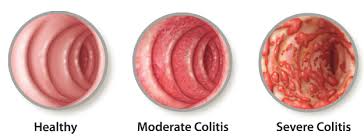Inflammatory bowel disease

Inflammatory bowel disease describes a condition in which the intestines are red, swollen, painful or hot. The two conditions that often come in mind are Crohn’s disease and ulcerative colitis. There are some differences with these two conditions and the treatment also varies slightly.
Crohns disease
Crohns disease is a disorder that can cause diarrhoea, belly pain, and other symptoms that affect the digestive tract. It results from the body mistakenly attacking its own healthy cells. Symptoms of Crohn's disease may include:
Diagnosis if often made with symptoms, imaging and examination with a colonoscopy. You may feel better if you avoid foods that upset your belly or stop smoking. At times stress may trigger a flare of Crohn’s disease. Treatment involves medication to reduce the inflammation. Sometimes surgery may be required to remove a blocked segment of bowel. Most patients can live a normal life if the disease is well managed.
Ulcerative colitis
Ulcerative colitis is a condition that causes diarrhoea, belly pain, and bloody bowel movements. These symptoms happen because the large intestine (colon) becomes inflamed and gets sores, called "ulcers." It is caused by the body’s immune system mistakenly attacking the healthy cells lining the colon. Symptoms may include:
You can improve your symptoms by avoiding certain foods that bring on the symptoms, or reduce stress if possible. Investigations involves imaging to assess for the area of the colon affected, and a colonoscopy to assess for the severity of the disease. Treatment involves medications that are commonly taken as tablets or as medication administered into the rectum. More difficult cases may require injections. Surgery is only offered as a last resort.